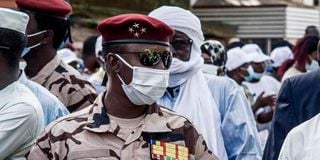Chad: From Idriss Deby Death To Talks Deal

Mahamat Idriss Déby Itno. He seized control following the death of his father, the country's longtime leader Idriss Deby Itno.
N'Djamena,
Chad has been mired in a political crisis since its iron-fisted president, Idriss Deby Itno, was killed last year after more than three decades in power.
A timeline of events:
On April 20, 2021, the army announces Deby died the previous day of injuries during operations to fight rebels in northern Chad.
The news comes shortly after the authorities announce he had won elections for a sixth term in office.
A junta dubbed the Transitional Military Council (CMT) is quickly formed, chaired by Deby's 37-year-old son Mahamat Idriss Deby, head of the powerful presidential guard. It dissolves parliament and the government.
The older Deby, a linchpin of Western-led anti-jihadist strategy in the Sahel, is praised by former colonial power France and other countries for his efforts to stabilise the region.
The next day, the new rulers proclaim Mahamat will "occupy the functions of the president" and serve as head of the armed forces for an 18-month transitional period.
The transition will lead to "free and democratic" elections although the period may be extended once, the authorities say.
Chad's main opposition parties denounce an "institutional coup d'Etat".
On April 23, a dozen heads of state attend Deby's state funeral, including French President Emmanuel Macron. He joins with regional allies to voice backing for Mahamat Deby.
On April 25, the military refuses to negotiate with the rebels who say they are open to a ceasefire.
Two days later at least six people die during banned protests against the junta.
On May 2, the junta names a transitional government, under Albert Pahimi Padacke, Deby's last premier.
The African Union calls for elections within the 18-month timeframe, but steps back from sanctions.
On August 12, the military rulers invite armed groups to take part in an "inclusive national dialogue", a forum which would be a precursor to elections.
The interim parliament takes office on October 5. It does not include any member from the Wakit Tama opposition alliance, which is campaigning for a return to civilian rule.
In late November the junta declares an amnesty for rebels and political dissidents, meeting a key demand by opposition groups invited to join the dialogue.
In late 2021, the junta schedules the start of the national forum for February 15.
In March the junta and rebel groups start talks in Qatar.
Discussions drag on for months in the face of discord among the rebels, and the national forum is repeatedly postponed.
On Monday, Chad's military government signs a peace deal with more than 40 rebel groups for attending the forum, which is now due to start on August 20. Two of the biggest rebel organisations refuse to accept the accord.





